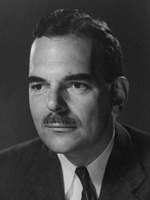| ||||||||||||||||||||||||||
All 6 Nebraska votes to the Electoral College | ||||||||||||||||||||||||||
|---|---|---|---|---|---|---|---|---|---|---|---|---|---|---|---|---|---|---|---|---|---|---|---|---|---|---|
| ||||||||||||||||||||||||||
 County Results
| ||||||||||||||||||||||||||
| ||||||||||||||||||||||||||
| Elections in Nebraska |
|---|
 |
|
|
The 1944 United States presidential election in Nebraska took place on November 7, 1944, as part of the 1944 United States presidential election. Voters chose six[2] representatives, or electors, to the Electoral College, who voted for president and vice president.
Nebraska was won by the Republican nominee, Governor of New York Thomas E. Dewey, running with Governor of Ohio John Bricker, with 58.58% of the popular vote, against incumbent Democratic President Franklin D. Roosevelt, running with Missouri Senator Harry S. Truman, with 41.42% of the popular vote.[3][4]
Dewey won Nebraska by a large margin of 17.2%, a 2.8% increase from Wendell Willkie's margin 4 years earlier in 1940. Key to his victory were his large margins in the rural agriculture-reliant counties, which had supported Roosevelt in his previous runs in 1932 and 1936, however turned against him in 1940, largely due to parts of The New Deal which paid farmers to destroy their crops to prevent overproduction backfiring, and causing food shortages, along with requiring more food to be imported from other countries.[5][6] With a swing to the right of 2.8%, Nebraska continued its heavy trend to the Republican column, with 1944 marking its 3rd consecutive swing the right, which began in 1936 with Alf Landon's surprising overperformance. Roosevelt did however manage to flip Greeley County by 23 votes, which had voted for Willkie.
With a nationwide Roosevelt popular vote victory margin of 7.5%, Nebraska voted 24.7% to the right of the nation, and the state would prove to be Dewey's second strongest state after Kansas.[7] Dewey's margin of victory was the most for any candidate since Roosevelt himself in 1932 and the most for a Republican since Herbert Hoover in 1928.
- ^ "United States Presidential election of 1944 - Encyclopædia Britannica". Retrieved December 22, 2017.
- ^ "1944 Election for the Fortieth Term (1945-49)". Retrieved December 22, 2017.
- ^ "1944 Presidential General Election Results - Nebraska". Retrieved December 22, 2017.
- ^ "The American Presidency Project - Election of 1944". Retrieved December 22, 2017.
- ^ "F.D.R.'s Disastrous Experiment". www.nytimes.com. Retrieved May 12, 2023.
- ^ "Farmers and the New Deal". History Learning Site. Retrieved May 12, 2023.
- ^ "1944 Presidential Election Statistics". Dave Leip’s Atlas of U.S. Presidential Elections. Retrieved March 5, 2018.


